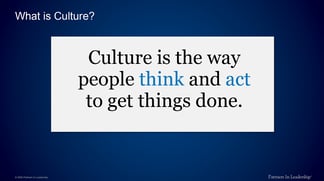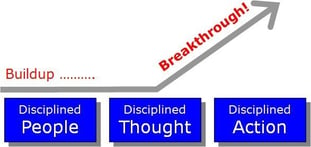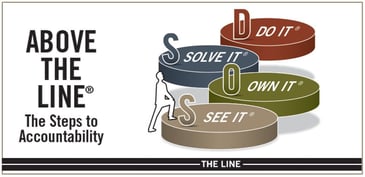 “In today’s world, strategy is relatively easy to replicate, and capital is relatively easy to access. What gives you a real source of competitive advantage is your talent and culture.”
“In today’s world, strategy is relatively easy to replicate, and capital is relatively easy to access. What gives you a real source of competitive advantage is your talent and culture.”
~Mary Meaney, Sr Partner, McKinsey & Company
We’re exploring the Four Steps to Accountability as described in Propeller: Accelerating Change by Getting Accountability Right:
Step to Accountability – Define Key Results
Step 1: Accountability - See it
Step 2: Accountability Steps - Own it – Total Ownership
Today we explore Step 3 Solve it. What is Above the Line Behavior? Watch this short 2:21 Clip
What is Culture
Culture is the sum of the experiences, beliefs, and actions enabling an organization to achieve its Key Results.
Culture is the way people think and act to get things done.
Above the Line Behavior gets things done.
The right culture practically guarantees success; the wrong culture almost always leads to failure.
Either you manage your culture, or it manages you.
What Does Solve it Look Like?
The Apollo 13 story illustrates the power of Solve It.
Do you remember the now-famous statement made by Jim Lovell from Apollo 13? “Houston, we have a problem.”
Minutes later, he discovered that the spacecraft was venting a gas, which turned out to be the Command Module’s oxygen.
The authors share: From the moment the spacecraft suffered its crippling malfunction to the moment three American astronauts landed safely in the water, the support team at NASA continued coming up with ingenious solutions to what seemed like unsolvable problems. At a crucial life-or-death moment when the CO2 filters in the Command Module Odyssey failed, threatening the crew with suffocation, someone suggested replacing the failed filters with those designed for the Lunar Module. When that proved infeasible because one filter was round and the other one square, one of the NASA scientists focused entirely on finding a solution. He dumped all the items available to the astronauts on a table and said, pointing to the objects, “We have to make this filter fit with that filter with nothing but that.”
Fit This Into the Hole for This using Nothing but that...
Apollo 13 (1995) - Failure Is Not an Option Scene
Apollo 13 – Brainstorming
Fueled by their Total Ownership of the situation and their unified mission to bring the three astronauts back safely, the support team diligently sought solution after solution to overcome one problem after another. When all three astronauts returned safely, the Apollo 13 mission became known as the Successful Failure.
When was the last time your department or business had a problem to solve?
Did your team respond with commitment and ownership?
Solve It Principles
High achievers channel their creative thinking into answering one deceptively simple, yet powerfully propelling question: “What else can I do?”
By constantly and rigorously asking the Solve It question, they avoid slipping into the victim cycle as they encounter and address obstacles on the road to success.
Four Solve It principles will help you stimulate the creative thinking needed to achieve Key Results:
- Create Space for Others to Fill. Arrogant, egotistical, and overconfident leaders will often think to themselves, “What else can I do to show people my awesome power?” Hey, look, it’s a superhero! What a beautiful cape, what a guy, what a gal! But look again, and you will see someone who easily falls prey to the Emperor’s New Clothes syndrome gaining the verbal admiration of people while failing to win their minds and hearts. Resist the temptation to jump in and Solve It, instead, maximize the human capital entrusted to you by encouraging everyone to ask, “What else can I do?”
- Engage More Brains at Work. Repeatedly asking the question “What else can I do?” stimulates higher levels of involvement. It reinforces ownership among those already involved and invites the uninvolved to get more involved. When that happens, a Culture of Accountability begins to take hold.
- Stay Engaged, Be Persistent, Think Differently, and Create New Connections. Half of corporate America is off to see the wizard, they are looking externally, outside themselves, for someone or something to give them the needed answers to overcome their problems. Like Dorothy in the Wizard of Oz, they’re off to see the wizard!
- Maintain a Culture Intent on Achieving Key Results. People often interpret the Solve It question as “What more can I do?” which is not the same as “What else can I do?” There’s a huge difference. “More” can mean “more of the same old, same old.” It’s about doing more! The word else suggests coming up with something new, different. “More” often courts failure; “else” generates creative new thinking to lead to success.
For more details on these principles check out Solve It: The 3rd Step to Accountability, or make sure to pick up the book or audio
To create an environment where everyone is inspired to give their best, contact us today to schedule a free exploratory meeting.
Growth demands Strategic Discipline.
 Building an enduring great organization requires disciplined people, disciplined thought, disciplined action, superior results, producing a distinctive impact in the world.
Building an enduring great organization requires disciplined people, disciplined thought, disciplined action, superior results, producing a distinctive impact in the world.
Discipline sustains momentum, over a long period of time, laying the foundations for lasting endurance.
A winning habit starts with 3 Strategic Disciplines: Priority, Metrics, and -2.jpg?width=310&name=3%20Disciplines%20of%20Execution%20(Strategic%20Discipline)-2.jpg) Meeting Rhythms. Forecasting, accountability, individual, and team performance improve dramatically.
Meeting Rhythms. Forecasting, accountability, individual, and team performance improve dramatically.
Meeting Rhythms achieve a disciplined focus on performance metrics to drive growth.
Let Positioning Systems help your business achieve these outcomes on the Four most Important Decisions your business faces:
|
DECISION |
RESULT/OUTCOME |
|
PEOPLE |
|
|
STRATEGY |
|
|
EXECUTION |
|
|
CASH |
|
Positioning Systems helps mid-sized ($5M - $250M) business Scale-UP. We align your business to focus on Your One Thing! Contact dwick@positioningsystems.com to Scale Up your business! Take our Four Decisions Needs Assessment to discover how your business measures against other Scaled Up companies. We’ll contact you.
 NEXT BLOG – Do It
NEXT BLOG – Do It
Solve it, is not the endgame. The next step in Accountability is, Do it. Next blog we’ll explore four Do It Principles to help you achieve the final accountability step in Above the Line Behavior.






.jpeg?width=150&height=135&name=Hand%20with%20marker%20writing%20the%20question%20Whats%20Next_%20(1).jpeg)

